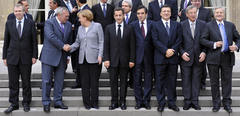 The Euro summit is underway now, and I’ve spoken to a few of my better-informed contacts about it. Here are some thoughts:-
The Euro summit is underway now, and I’ve spoken to a few of my better-informed contacts about it. Here are some thoughts:-
1) The bailout model they’re meant to agree to in Paris does, indeed, seem to be that of Sweden ‘92. It’s being called that in France and Germany, but you can bet Brown will be calling it the British/Brown Model – he’s on a relentless mission to make political capital out of this.
2) It is worth someone (like Cameron) pointing out that the UK is probably in the worst position of the EU countries. Not only were our banks the most over-extended but our household debt is the highest any G7 country has already seen.
The UK was the most exposed, led into debt by a spendthrift government. This is crucial, absolutely crucial, to understanding the depth of our problem. It explains why Brown will be nationalising so many banks tomorrow (lowdown here). It is not unpatriotic for the Tories to make this point as loudly as they can.
3) Brown says the aim is for banks “to lend to small businesses and homeowners at prices they can afford”. In which case another cut of another half a percentage point is needed. Interbank rates are two points higher than the Base Rate and are likely to stay there, as they did in the early 1990s.
4) A solid example: The Sunday “Money” sections today showed the cheapest mortgage has gone back up to 5.4% (First Direct). Four weeks ago it was 4.99%. So much for the radical half-point rate cut last week.
5) I’m sick of 1929 Crash analogy being reheated by nostalgic Keynesians anxious to follow this chaos with a power grab by politicians. To my mind, the more relevant analogies are with 1990 Japan, 1992 Sweden and the 1997 Asian Crash. The losses are calculable – about $1.5 trillion (see p15 of this IMF study) so as a share of GDP we are closer to the Scandinavian banking crisis then the Japanese one, far less 1929.
6) To use Nick Clegg’s elegant analogy, we’re still in “man the lifeboats” mode – rather than asking who steered us into the iceberg. But when the questions are asked, one major aspect of this may be the AAA mess-up – the wrong certification being given to dodgy loans, creating mispriced debt and compounding the errors of the Bank of England and the Fed.
7) The more immediate story is the bank bailout, as we see from tomorrow’s front pages. The Guardian, whose coverage of this has been excellent, says the cost to the taxpayer is £75bn. The Telegraph says Brown “ordered nationalisation” and The Sun sums up the new sentiment perfectly- “Cashier No10, please”.







Comments